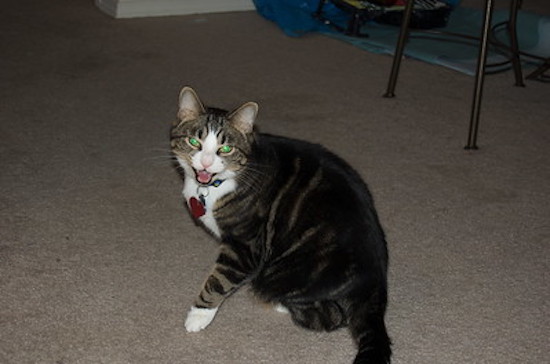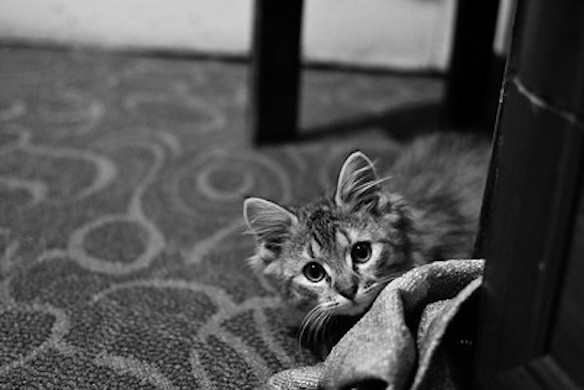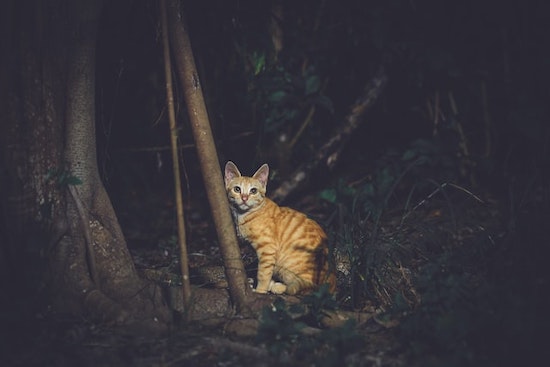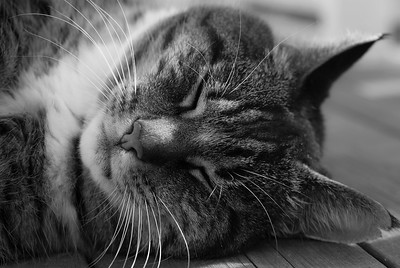Why do cats meow at night? A question often asked by many cat parents.
While meowing, in general, is a form of communication with people, adult cats don’t actually meow at each other. However, kittens use this form of vocalization to let their mothers know they are hungry or cold. But once they are older, they no longer use this form of communication.
But when cats start meowing alone during the nighttime, this can raise concerns for cat owners. Though a tough call to make, excessive meowing at night actually depends on the cause, and there can be a few reasons for this.

Why Does My Cat Meow During the Nighttime?
While listening to a cat’s night calling in the middle of the night is not an unusual thing, but if it’s your cat that is meowing, then it may be something that you should concern about. It can particularly be distressing and confusing at the same time when you hear your cat constantly yowling loudly.
A yowling cat at night might have something to say and wants to say it. There are several reasons why you are hearing your cat meowing during the nighttime.
However, once you understand the reason behind it, you will be easily able to find a solution to the problem.
Read on to find the possible causes behind why do cats meow at night.
1. Cats Are Nocturnal
It is widely known, and you probably know it too, that cats are like night owls, and it is true. Felines are most active during the nighttime. In fact, cats are crepuscular (active at dusk and dawn) and nocturnal (active during the night time).
And many cat parents find this nighttime activity in cats frustrating, though this is a natural thing in all cats. Moreover, this is especially noticeable when it comes to young kittens and outdoor cats. The natural nocturnal cycle is wired in cats, and the house cats instinctively follow it. While it might be perfectly normal for the cats, but this tends to create problems with the non-nocturnal humans that sleep at night.
Though some cats adapt to the routine of the household, sometimes they may start meowing due to the crepuscular tendency. This is not something to worry about; it is just a natural part of their behavior.

2. She Is Hungry
Nighttime caterwauling can also be the reason behind your cat’s hunger. Your unpleasant nightly awakenings are the result of your cat’s hunger, or it can also be due to thirst.
Your cat is thirsty, and her water bowl is empty, and all she can do is meow in anticipation that her owner will come and fill up the water bowl.
TIP: Make sure you feed healthy cat food to your feline friend in the evening, before bedtime. Likewise, also make sure that the water bowl is filled, and your kitty has enough water for the said night. You can also get an automatic feeder that can take care of your cat’s hunger during the nighttime or also when you are gone for the day.
3. Boredom or Loneliness
If your cat is not hungry, chances are that she is meowing because she is bored or lonely. In fact, it is believed that constant cat meowing can be due to many reasons, and one of them is loneliness. Meowing and yowling at night means that your cat is trying to catch your attention and tell you that she is bored.
Most of the cats tend to spend the daytime sleeping with little to no active play. Excessive energy can cause your cat to meow at nighttime, meaning that she is bored and wants to play.
TIP: Though it is essential that you address your cat’s needs, continuously complying with their “meows” may lead your cat to ask for more often. Thus, if this is a frequent occurrence, then you should try not to give attention to your cat. Instead, you can leave some cat toys out for your cat, so she can overcome her boredom at night.
4. She Wants to Go Out
If your cat has been going outdoors during the day, and you are keeping her indoors during the nighttime, then it is likely that your cat is yowling because she wants to go outside.
Your cat wants to have access to the open world outside, but she is being kept in, and the meowing intensifies. Your cat may randomly want to go outside, and this can be a problem if you have recently shifted to a new house, or if your cat is recovering from surgery or illness.

And constant meowing may want you to let your cat out — however, it is best that you keep your cat indoors at night to protect her from the hazards of the roads and preys.
5. Your Cat Wants to Mate
Meowing or commonly known as “mating calls” — which are usually defined by the lengthy sequences of trills, trill-meows, and meows from female cats that are in heat and want to attract a male cat.
Likewise, this is also true for male cats who respond to the yowling of female cats that are in the heat cycle. When a male cat smells the presence of a female cat that is available and ready to mate, the tomcat will “call out” to her.
You may notice your male cat meowing and yowling with urgency and frequency, just to highlight his existence for the female cat. Moreover, this usually happens during the night time or evening, so you better keep those ears covered.
6. Medical Problems
If the above reasons are not applicable for the cause of your cat meowing during the nighttime, there are chances your cat might have developed some sort of medical condition or illness.
In medical terms, changes in cat meowing at night can be related to a number of medical conditions, such as hyperthyroidism, hypertension, or laryngeal/voice box disease.
Similarly, distress associated with neurological function can also lead to meowing and yowling. On the other hand, cats that have dementia will show a state of confusion, disorientation, and also decreased awareness of their surroundings.
Ultimately, any medical condition that results in physical or mental pain can cause cats to meow loudly. And it is up to you to notice those kinds of “meows” at night that might be telling you it is time to visit your vet.
7. Your Cat Is Getting Old
When cats get old, they suffer from the same mental confusion or cognitive dysfunction as humans. They often become disoriented and often cry for no apparent reason, and this usually happens during the nighttime. Moreover, it could also mean that your cat may have CDS (Cognitive Dysfunction Syndrome).

This condition has a direct link with the brains of the senior cats, and it can have a variety of symptoms, and meowing and yowling during the nighttime is one of them.
Final Thoughts
So, why do cats meow at night when you’d rather be sleeping? The reasons are many, and some may require serious attention. Therefore, before you try to curb your cat’s nighttime meowing, you should try to understand the cause behind it.
Moreover, look at the situation around your cat’s nighttime behavior, and try to make note of what may seem to get her to stop meowing at night. At last, if you think your cat has developed a medical condition, it might be time to pay a visit to the vet.
References
- Why Does My Cat Meow at Night? — Purina
- How To Get Your Cat to Sleep At Night— PetMD
- How To Get A Cat To Stop Meowing At Night — BCP Veterinary Pharmacy

